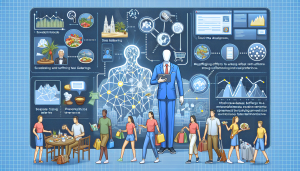 UseCasesFor.ai
UseCasesFor.ai
Choose Topic
 UseCasesFor.ai
UseCasesFor.ai
AI Use Cases
A collection of over 250 uses for artificial intelligence
A continually updated list exploring how different types of AI are used across various industries and AI disciplines,including generative AI use cases, banking AI use cases, AI use cases in healthcare, AI use cases in government, AI use cases in insurance, and more

Sign up
to receive a PDF containing all the use cases and stay updated with the latest AI trends and news (you can always unsubscribe)
Tourist behaviour analysis

Introduction
The tourism industry is one of the fastest-growing sectors globally, generating billions of dollars annually. Recent advancements in Artificial Intelligence (AI) and Machine Learning (ML) are transforming the industry by enhancing decision-making, customer experiences, and operational efficiency. These technologies provide insights into tourist behavior, enabling businesses to create personalized marketing strategies, optimize itineraries, and predict future trends. AI-powered tools like chatbots improve customer service by offering instant, tailored responses, while ML algorithms analyze large datasets to offer precise travel recommendations and adjust prices dynamically for maximum revenue. Applications of AI and ML in tourism range from automated language translation and real-time monitoring of tourist satisfaction to advanced security and emergency preparedness systems. AI enhances the tourist experience by suggesting adaptive itineraries based on preferences, managing resources effectively, and ensuring sustainability through smart waste management practices. By leveraging these innovations, the tourism sector can provide a more seamless, personalized, and secure experience for travelers, while businesses benefit from improved operational efficiency and customer satisfaction.
Challenges
There are several issues that affect the ability of the tourism industry to understand the tourists’ behavior and, consequently, provide for their needs and wants. One of the major challenges is the large data sets created by the tourists in the course of their travel through online booking sites, social media and customer reviews. It is impossible to process this data by hand and it will take a lot of time. Also, the tourist behavior is quite diverse and can be affected by numerous variables, which makes the predictions rather uncertain. The industry also faces the problem of providing personalized services to suit the particular needs and desires of each tourist. This is interesting because although so much data is available, many tourism businesses do not have the right tools or skills to harness the data.
AI Solutions
There are several issues that affect the ability of the tourism industry to provide quality services and products to the consumers. These include the use of AI and ML to analyse big data in order to understand the behaviour of the tourists. This makes it possible to create predictive models using the historical data through the application of ML algorithms. Through applying the concepts of AI, it is possible to deliver personalized services by assessing the preferences of an individual and tailor-suit recommendations to suit his or her tastes. AI can also help in performing routine tasks thus allowing more time to be spent on important issues. For instance, chatbots can answer simple questions from customers, while the complex ones are handled by human representatives. Real time analysis of tourists’ behavior is possible with the use of AI which helps organizations to changes with the trends.
Benefits
There is a wide range of advantages that are derived from the use of AI and ML in the analysis of tourist behavior. It allows the organizations to make better decisions based on the data that they collect which increases the efficiency of the organization as well as its competitiveness. Through tourist behaviour prediction, it becomes easier for the businesses to improve their services, enhance the customers’ experience, and encourage them to come back. This is because, personalized services help in creating a good impression on the customers thus making them become loyal to a certain company. This means that automation of tasks can reduce costs while increasing efficiency thus creating a competitive edge. Real-time insights make it possible for organizations to adapt to changes within the market environment and capitalize on them while at the same avoiding risks.
Return on Investment
It is possible to achieve a high ROI when investing in AI and ML when applied to businesses in the tourism sector. Based on the Accenture report, firms that adopt AI and ML can expect to increase their cash flows to twice or more by 2035. Although it is a costly exercise at the beginning, the long-term advantages include enhanced efficiency, increased customer satisfaction, and higher profitability. Also, the application of AI and ML can also result in the development of new sources of income, for instance, in the creation of individual tours and tours’ marketing strategies.